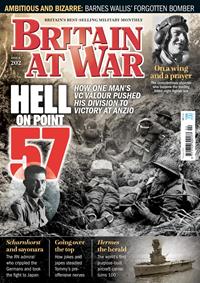|
|
Contents Listing - Articles & Features in this issue
FEATURES JUDGEMENT DAY At the outbreak of war in 1939, British and French naval forces in the Mediterranean far out-gunned the Italian fleet. But when France surrendered less than a year later it left the Italian navy dominant in the region. The Royal Navy responded in the only way it knows - by attacking. On 11 November 1940, four Fleet Air Arm squadrons carried out a daring attack on the Italian port of Taranto. Not only was the raid the first major victory for naval air power in the world, it is seen by many as a blueprint for the Japanese strike on Pearl Harbor. FROM RUSSIA WITH LOVE When RAF veteran George Shepherd visited the RAF Museum at Cosford in Shropshire, poignant memories of the fateful day when the Handley Page Hampden bomber he was in, P1344, was shot down came flooding back. Here, David Bowers investigates why this Coastal Command aircraft came to be in the chilly blue Arctic skies over Finland, and how, some fifty years later, the aircraft eventually returned home. A BOYS' OWN ADVENTURE The Mediterranean air war during the Second World War saw many dramatic events but none, writes Chris Goss, could be more dramatic than the events that were experienced by a 20 year old RAF pilot and 21 year old German pilot on 1 February 1944. Page 19 GERMAN BOUNCING BOMBS! We examine the day that two German Focke Wulf Fw 190 fighter-bombers attacked the south coast village of Selsey - a raid in which they sent their bombs quite literally bouncing over the streets. REGULARS DATAFILE In this month's Datafile, Mark Khan investigates the principal British infantry anti-tank weapon of the Second World War, the Projector, Infantry, Anti-Tank or PIAT. CAMERA AT WAR A selection of photographs depicting the impressive 'Montgomery' Bridge, a Bailey bridge, that was built across the Rhine at Wesel. TEN THINGS YOU PROBABLY DIDN'T KNOW ABOUT ... FIELD MARSHAL LORD ALANBROOKE. Having been the Chief of the Imperial General Staff (the title of the commander of the British Army from 1908 until 1964) during the Second World War, Alan Francis Brooke was promoted to Field Marshal in 1944. As chairman of the Chiefs of Staff Committee, he was the foremost military advisor to Winston Churchill, and is regarded as one of the chief architects of the Allies' victory in 1945.
Article Snippets
Can you provide something to add to this area?
This part of the page works like a Wikipedia entry - we welcome contributions from anyone to improve the usefulness of this page
Click the '?' above for more information.
Adverts and Links based on this content
Advertisement



